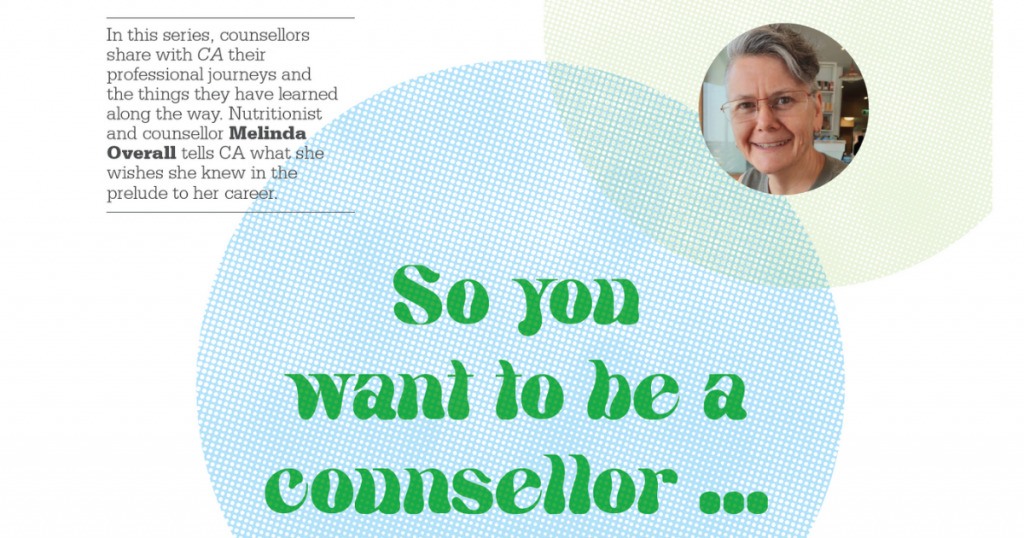Professional Advice: So you want to be a Counsellor…. Part 4
So You Want To Be A Counsellor is a multi-part advice series where counsellors share with ACA their professional journeys and the things they have learnt along the way. As featured in the Counselling Australia Journal Summer 2023, Volume 23 Number 4.
In part 4, Nutritionist and counsellor Melinda Overall tells us what she wishes she knew in the prelude to her career.

Looking back to your final year as a student (before starting your counselling career), what are the top three pieces of advice you would give?
1. Find a supervisor who you trust and who can help you grow in your practice – and start looking for them early.
2. Remember that you won’t be the right fit for every client, they might go elsewhere, and that’s totally ok. They need the right person to do their work.
3. Know that you have to keep doing your own work to grow as a person and practitioner.
Would you change your decision to become a counsellor? Why or why not?
Absolutely not. I love this work and really appreciate the privilege that it is to work with clients. My understanding of working with my nutrition clients and students has deepened in my 5.5 years of counselling practice. I had a 25-year career in human resources prior to studying nutrition (I’ve been a nutritionist for 10 years) and counselling, and I wish that I had studied counselling earlier. I’m currently planning on heading back to university to complete a Master of Counselling.
How do you describe the work that you do?
As I have the three different aspects to my work, describing it depends on which part I’m discussing. I describe my nutrition work as working with clients to improve their health and wellbeing through increasing their understanding about food and its impact on their health. This can include development of meal plans or general recommendations around diet. Information provided to clients might also include lifestyle recommendations. My work also includes analysis of diets and blood test results to determine any suboptimal micronutrient levels, and assisting to correct them with nutritional supplementation.
As a lecturer in clinical nutrition, I teach fundamentals of the above to students and supervise nutrition students in the student clinic. As a counsellor, I think I best describe my work as developing therapeutic and healing relationships with clients so that they feel safe to work through, contemplate and develop strategies to manage life’s stressors and difficulties. I view myself as a humanistic strengths-based practitioner who aims to assist people develop resilience and to improve their self-view.
Do you love your work? Why?
I do love my work. Mainly because I have three work streams and this ensures variety, different learning and exposure to different people and work settings. I also really appreciate the synergy between my work as a nutritionist and counsellor. My nutrition clients and counselling clients never shift to the other part of my practice. It is fabulous to recognise how the skills of each practice support the other, and improve outcomes for clients. This is especially so in the context of the gut–brain axis and recognising the significant role that food plays in mood. In all of my work streams, it is such a gift to be able to support people and to witness their growth.
How do nutrition and counselling combine and what is their importance to each other?
I am a university-qualified nutritionist and qualified counsellor working in private practice in Sydney’s inner west, and I am a lecturer in Nutritional Medicine at Torrens University. My career mission is to help people obtain optimal health through diet and lifestyle coaching with minimal supplementation.
I am passionate about food as medicine and am a firm believer in the concept of ‘food first’ wherever possible. The choices we make around food can significantly impact our health and wellbeing, for better or worse. With a busy lifestyle, it is easy to get lost in those food choices, but with a nutritional guide, you can make better decisions, get back on track and enjoy a healthier you.



